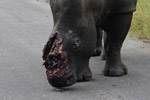It’s well known that much of the world’s massive illegal wildlife trade ends up in China, including poached tigers, pangolins, and bears. But now those who order pangolin fetuses, tiger blood, or bear bile at a restaurant or market may see significant jail time. According to a reinterpretation of Chinese law by the Standing Committee of the National People’s Congress (NPC), consumers of some 420 rare or endangered species in China could be sentenced to over ten years depending on the offense.
“Buyers are a major motivator of large-scale illegal hunting,” said Lang Sheng, Deputy Head of the Legislative Affairs Commission of the NPC Standing Committee.
Trading in rare or endangered species as already illegal in China, but the new interpretation of the law adds consuming, or eating, such species as “trading,” making consumers directly liable. Still, the new legal interpretation allows consumers to eat animals that were captive bred, raising questions about how well the law can be enforced. China is home to a number of so-called tiger farms and bear bile centers where captive breeding animals for consumption is the norm.
Despite this loophole, conservationists have generally praised the move, seeing as one of several new efforts by the Chinese government to tackle the illegal wildlife trade and other environmental problems.
“President Xi’s administration has stated its intent to increase environmental protection,” said WildAid Executive Director Peter Knights. “Last year they banned shark fin from all state banquets. In January they publicly crushed seized ivory. State media supported the world’s largest demand reduction campaign for wildlife developed in partnership with WildAid and led by Yao Ming and Jackie Chan. This is another forceful step in wildlife protection that will impact animals globally.”

Sun bear bile extraction factory in Myanmar. Photo by: Dan Bennett/Creative Commons 2.0.
Related articles
Islamic clerics issue ‘fatwa’ against poaching, declare the illegal wildlife trade ‘haram’

(03/10/2014) Indonesia’s Islamic clerics drew praise from conservation groups last week after the top clerical body in the world’s largest Muslim-majority country issued a fatwa, or religious decree, against poaching and wildlife trafficking. The Indonesian Council of Ulema (MUI) announced the fatwa on Tuesday, declaring the illegal wildlife trade to be haram, or forbidden under Islamic law. The fatwa forbids Indonesia’s Muslims from “all activities resulting in wildlife extinction” and is meant in part to help support existing national laws protecting endangered species, which are poorly enforced and have done little to prevent poaching.
Rhino with bullet in its brain and hacked off horn wanders for days before being put down

(03/05/2014) Last week, visitors in Kruger National Park came on a horrifying sight of the poaching trade: a rhino, still alive, with its horn and part of its face chopped off. The gruesome photo of the young rhino went viral and sent South African authorities scrambling. Five days after the sighting, South African National Parks (SANParks) has announced they found the rhino and put it out of its misery.
South Africa loses nearly 150 rhinos to poachers so far this year
(02/28/2014) Since the first of the year, South Africa has lost 146 rhinos to poachers or approximately 2.5 rhinos every day. This is a slight dip from last year’s poaching rate, which hit 1,004 for the whole year or 2.75 a day. South Africa is home to more rhinos than any other country on the planet, but the populations have been hit hard by poachers in recent years seeking rhino horn.
Conservation groups launch new whistleblower site for wildlife and forest crimes
(02/18/2014) Welcome to Wildleaks: a new website that aims to give the global public a secure and anonymous platform to report wildlife trafficking and illegal deforestation. The illegal wildlife trade has become one of the world’s largest criminal activities in recent years, decimating elephants, rhinos, tigers, primates, and thousands of lesser known species. Meanwhile, illegal logging is rampant in many parts of the world, imperiling biodiversity, undercutting locals, and robbing governments of revenue.
(02/12/2014) Forest elephants have suffered unprecedented butchery for their ivory tusks over the past decade, according to new numbers released by conservationists today in London. Sixty-five percent of the world’s forest elephants have been slaughtered by poachers over the last dozen years, with poachers killing an astounding nine percent of the population annually. Lesser-known than their savannah cousins, a genetics study in 2010 found that forest elephants are in fact a distinct species, as far removed from savannah elephants as Asian elephants are from mammoths. These findings make the forest elephant crisis even more urgent.
Obama announces new strategy to tackle wildlife trafficking, including toughening ivory ban
(02/12/2014) Yesterday, the Obama administration announced an ambitious new strategy to help tackle the global illegal wildlife trade, including a near-complete ban on commercial ivory. The new strategy will not only push over a dozen federal agencies to make fighting wildlife trafficking a new priority, but will also focus on reducing demand for wildlife parts and actively engaging the international community. The U.S. is the world’s second largest destination for illegal wildlife trafficking after China.
Hong Kong to destroy 4,000 dead elephants’ worth of ivory

(01/24/2014) The government of Hong Kong will destroy 28 tons of ivory confiscated from traffickers, reports CNN. The announcement, which comes just weeks after China destroyed six tons of seized ivory, suggests that the leaders of the world’s largest market for ivory may be getting more serious about addressing a global poaching boom, say conservationists.














